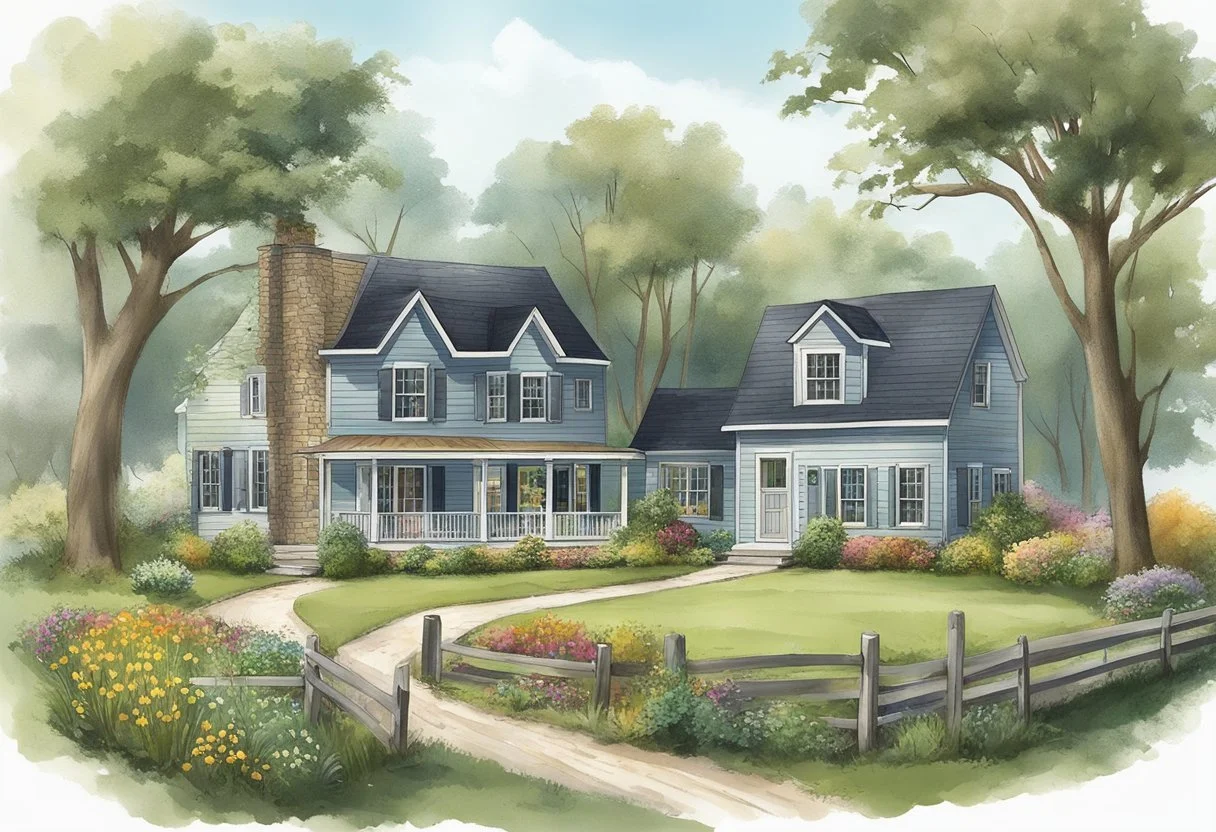Homesteading in Delaware
A Concise Guide
This Article is Part of Our Guide Homesteading State by State
Homesteading has made a resurgence across the United States in recent years, and the small state of Delaware is no exception. Despite its compact size, Delaware offers a diverse landscape and a variety of opportunities for those seeking a self-sufficient lifestyle on small acreage. From the fertile soils of New Castle County to the more rural landscapes of Sussex County, aspiring homesteaders can find their place within this charming state.
Delaware's unique blend of affordable land, agricultural heritage, and proximity to major metropolitan areas makes it an attractive destination for homesteading. Small acreage homesteads can thrive here thanks to the state's moderate climate, which supports a variety of crops and livestock. Additionally, the state provides a wealth of resources and support for agricultural endeavors, further bolstering the appeal of starting a homestead in Delaware.
For those considering the prospect of embarking on the homesteading journey in Delaware, it is essential to research the different regions, resources, and regulations to ensure success. This article aims to provide a comprehensive guide on starting a small acreage homestead in Delaware, touching on various aspects such as land selection, crop and livestock options, and financial considerations, among others.
What is the Homesteading Exemption in Delaware and is it Related to Farming?
In Delaware, the homestead exemption is a property tax relief program for homeowners, but it is not directly related to farming.
The key details:
The homestead exemption excludes a portion of the assessed value of an owner-occupied primary residence from property taxes.
To qualify, the owner must occupy the property as their primary residence and meet certain ownership criteria.
It provides tax relief specifically for eligible owner-occupied primary or secondary residences.
Agricultural lands may qualify for preferential assessment under Delaware's agricultural lands preservation program if used commercially for farming.
The ag lands program has separate eligibility criteria focused on commercial agricultural operations and land preservation.
The homestead exemption applies only to qualifying primary or secondary residences and is separate from the ag lands program.
In summary, Delaware's homestead exemption is intended to provide residential property tax relief to homeowners. Agricultural lands could receive preferential assessment under the agricultural lands preservation program which supports commercial farming operations. The homestead exemption itself is not related to farming.
Understanding Homesteading in Delaware
Homesteading in Delaware offers individuals and families an opportunity to live a self-sufficient lifestyle in a state known for its rich agricultural history and diverse natural resources. Delaware's temperate climate, fertile land and accessibility to urban centers make it a promising destination for those seeking to live off the land.
The first step in establishing a homestead in Delaware is to find a suitable piece of land. Many aspiring homesteaders look for small-acreage properties with ample space for gardens, orchards, and raising livestock. Depending on the location and size of the property, prices can vary considerably. However, rural areas often offer affordable real estate options.
Once land has been acquired, homesteaders rely on a combination of skills and knowledge to cultivate a successful and self-sufficient lifestyle. This includes growing and preserving food, caring for livestock, managing water and energy resources, and being prepared for emergencies or natural disasters. While it may be challenging at first, with patience and dedication, homesteading in Delaware can be a rewarding and sustainable way of life.
A crucial aspect of homesteading in Delaware is the importance of staying informed about local regulations and ordinances. This can include zoning laws, building codes, and restrictions on keeping livestock or poultry within certain areas. Becoming active in local community groups or attending workshops and classes can help homesteaders stay up-to-date on any changes that may affect their lifestyle or property.
When it comes to growing crops, Delaware's climate allows for a diverse range of fruits, vegetables, and grains. From annual staples such as corn, tomatoes, and squash to perennials like asparagus and berries, homesteaders in Delaware can enjoy a varied and nutritious diet throughout the year. Additionally, raising chickens, goats, or even bees can provide a valuable source of eggs, milk, and honey, contributing to a self-sufficient lifestyle.
In conclusion, embracing the homesteading movement in Delaware allows individuals and families to live a more self-reliant and sustainable lifestyle, one that values close connections to the land and local community. With its fertile soil, favorable climate, and supportive network of fellow homesteaders, Delaware's rural regions offer a welcoming environment for those seeking a simpler, more self-sufficient way of life.
Real Estate Overview: Delaware
Delaware, a small coastal state on the Eastern seaboard, is an attractive location for homesteading on small acreage. With a variety of property types and affordable prices, Delaware offers potential homesteaders various options when seeking suitable land. The state is known for its relatively low cost of living and favorable tax environment, which can help make owning a property or starting a small-scale farm more accessible.
In recent years, Delaware has seen a growth in real estate activity, inspiring more people to consider living in this beautiful state. There is a range of properties for sale in Delaware, from residential homes to larger land parcels that could serve as ideal homesteads. Delaware land sales have shown a steady increase, indicating that more buyers are realizing the potential of this small but resource-rich state.
As you consider purchasing property in Delaware, it's important to research the real estate market and stay updated on property price changes. In general, the state offers a mix of affordable and mid-range properties, providing opportunities for a wide range of homesteading budgets.
Some popular areas for homesteading in Delaware include Sussex County, known for its agricultural lands, and Kent County, offering both rural and small-town settings. These areas provide nearby real estate options that can cater to your homesteading needs.
When selecting a property for your small acreage homestead in Delaware, it's essential to consider factors such as soil quality, water availability, and regional climate. Additionally, zoning and land use regulations can impact your future plans and should be thoroughly understood before committing to a specific parcel.
In conclusion, Delaware is an excellent choice for those considering homesteading on small acreage. The state's real estate market is diverse and generally affordable, providing a range of properties suitable for various requirements. With proper research and careful consideration, you can find a perfect property in Delaware to begin your homesteading journey.
Examining Land for Sale in Delaware
When searching for the perfect plot of land for homesteading in Delaware, it is crucial to consider several factors such as listing price, price per acre, and the size of acreage for sale. By examining the available land for sale in Delaware, prospective homesteaders can find their ideal location to settle down and cultivate a self-sufficient life.
First, take into account the listing price of the land for sale. The range of prices in Delaware offer homesteaders various choices to suit their budget. It is essential to compare different properties to ensure that each potential homesteader can find a parcel within their financial means.
Next, consider the price per acre of the available properties. Homesteaders looking for a small acreage can benefit from comparing price per acre data. This information helps in determining the most cost-effective option, ultimately allowing for better budget allocation and investment in other aspects of the homestead.
When exploring acreage for sale, it is advisable to target properties that best match the preferred size and type for the intended homestead. Factors that impact the choice of land could include soil quality, access to water, and the availability of resources necessary for self-sustenance.
A final factor to consider when examining land for sale in Delaware is the listing age. The presence of older listings may indicate that the price may be negotiable, while newer listings might show that the demand is high, leading to stronger competition.
By confidently and thoroughly examining the land for sale in Delaware, potential homesteaders will be better equipped to make an informed decision, ultimately leading them to find the perfect plot for their future homestead.
Analyzing Average Purchase and Property Price
When looking into homesteading in Delaware on a small acreage, it's essential to analyze the average purchase price and property price in the area. To give homesteaders an idea of the potential costs of land, this section provides an overview of property prices in Delaware.
The average purchase price of a property in Delaware varies depending on the location, size, and available resources. For the purpose of homesteading, small acreages range from one to ten acres. Typically, the prices for these tracts of land can range from $50,000 to $200,000, with some variations based on the factors mentioned above.
As for the median purchase price, it gives a more accurate representation of the central tendency of property prices in Delaware. The median purchase price for small acreages, particularly those suitable for homesteading, is approximately $100,000. This signifies that half of the properties in this category have prices above this mark, while half have prices below.
Comparing average and median purchase prices, it becomes apparent that the $100,000 median price may better represent the costs for homesteaders seeking to purchase a small acreage in Delaware. This is due to the influence of outliers or extremely high or low prices that may skew the average.
Here is a summary of the property prices for small acreages in Delaware:
Average purchase price: $50,000 to $200,000
Median purchase price: $100,000
Keep in mind that these prices serve as a general guideline and may vary depending on multiple factors like location, resources, and current market conditions. Thorough research and due diligence are crucial before making any final decisions about homesteading in Delaware.
Evaluating Average Property Size in Delaware
In Delaware, the average property size available for homesteading can vary depending on the location and zoning regulations. Generally, small acreages range between 1 to 10 acres. The property size influences the type of homesteading activities that can be pursued and the overall investment required.
When considering a small acreage for homesteading, it is essential to evaluate the land's suitability for various activities, such as gardening, raising livestock, and establishing sustainable systems. For instance, a 1 to 3-acre plot might be ideal for a vegetable garden, small orchard, and few chickens. On the other hand, a larger property of 5 to 10 acres would provide more opportunities for diverse farming techniques and larger livestock herds.
It is also important to factor in local zoning laws when assessing average property sizes in Delaware. Some areas have minimum acreage requirements for certain activities like keeping large farm animals. This could impact your plans for homesteading if the property is not large enough to meet the zoning requirements.
In conclusion, evaluating the average property size in Delaware for a homestead will require research and careful consideration of factors such as location, desired activities, and local regulations. By understanding these aspects, prospective homesteaders can make informed decisions about the most suitable small acreage properties for their needs.
Expanding to Farmlands and Small Homesteads
In Delaware, those looking to live off the land can explore opportunities in both farmlands and small homesteads. The state offers a variety of agricultural properties that provide ample space and resources for sustenance farming. Many homesteaders in Delaware have successfully achieved a self-sufficient lifestyle by cultivating their land and taking advantage of the natural resources available.
When considering farmland in Delaware, potential homesteaders should evaluate the soil quality, water access, and climate. The state is known for its fertile lands, with many farmers focusing on growing crops such as corn, soybeans, (how long do soybeans last?) and wheat. Additionally, Delaware's moderate climate and adequate rainfall create favorable conditions for agricultural pursuits, making it an ideal choice for aspiring homesteaders.
Small homesteads are another viable option for those looking to embrace sustainable living on a smaller scale. Delaware offers various homesteading properties ranging from a few acres to tens of acres, providing enough space for growing food, raising livestock, and building a comfortable home. Homesteaders can also take advantage of Delaware's agricultural extension programs, which offer valuable resources and guidance on effective farming and land management techniques.
In conclusion, whether it’s a vast farmland or a cozy small homestead, Delaware presents numerous possibilities for individuals seeking to live off the land. The state's abundant natural resources and supportive agricultural community make it an attractive choice for those aspiring to lead a more self-sufficient and sustainable lifestyle.
Special Focus On Sussex County
Sussex County is a prime location for small-acreage homesteading in Delaware. This area is known for its fertile soil and diverse agriculture, making it a suitable choice for individuals interested in pursuing self-sufficient lifestyles.
Although the region is primarily rural, Sussex County has numerous resources available for homesteaders. For instance, several local agriculture extension offices provide valuable information on sustainable farming techniques and land management practices, specifically suited to the region's climate and soil conditions.
Homesteaders in Sussex County enjoy milder winters and moderate rainfall, which promotes successful gardening and crop production. The area's productive farmland makes it possible for small-acreage properties to grow a variety of crops. Popular choices for homesteaders include corn, soybeans, wheat, and vegetables, as well as small fruit and nut orchards.
Moreover, Sussex County has a strong agricultural heritage, which creates a supportive community for new homesteaders. Local farmers' markets and agricultural festivals provide opportunities for small-scale producers to sell their products, learn about new techniques, and connect with like-minded individuals. Additionally, the county's low property taxes and reasonable land prices make it an attractive option for beginning and experienced homesteaders alike.
In summary, Sussex County, Delaware offers many advantages for individuals looking to establish successful small-acreage homesteads. Its fertile soil, favorable climate, and supportive community make it an ideal location for those pursuing a self-sufficient lifestyle.
#DelawareHomestead #SmallAcreageLiving #ConciseHomesteading #HomesteadingGuideDE #DelawareHomesteadLife #PracticalDelawareLiving #HomesteadTipsDE #RuralLivingDE #SustainableAcreage #DelawareDreamHomestead





